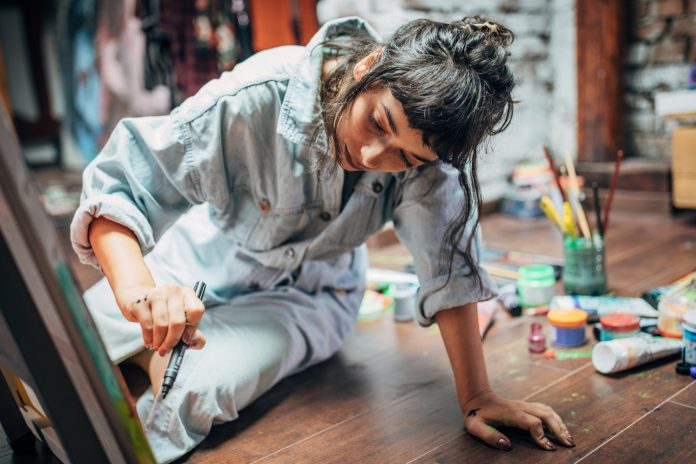Here, we explore why women are missing out on the physical and mental benefits of engaging in hobbies and why, in our modern society, female-specific hobbies are seen as less worthwhile than men’s
For women throughout history, hobbies have served as a source of solace, creativity, and personal fulfilment, so why don’t modern women have the time to spend on them, and why is there a gender gap when we examine hobby rates between men and women?
Despite the myriad benefits of hobbies, research suggests a gendered disparity in their pursuit. While hobbies can offer personal fulfilment, stress relief, and social connections, societal expectations and cultural norms often influence the types of activities men and women engage in. This exploration delves into the reasons behind this gender gap and examines the potential implications for individuals and society as a whole.
Whether it’s painting, gardening, sports, writing, or dancing, hobbies have the power to nurture our souls and ignite our passions. However, numerous studies have shown that there is a gendered gap in men’s and women’s ability to pursue hobbies and a disparity in the hobbies that each gender pursues.
How can marriage affect women and their hobbies?
According to the Office for National Statistics, women carry out an average of 60% more unpaid work than men. When women get married to men, they tend to lose time that they could use to pursue hobbies as they take on more unpaid labour.
Women put in more than double the hours when it comes to cooking, childcare, cleaning, and housework. For many women, this unpaid work is often on top of a full-time job; this gendered division of labour can have a direct impact on women’s ability to engage in hobbies.
For many women, the burden of unpaid domestic work can feel overwhelming, leaving little time or energy for personal pursuits. Additionally, societal expectations and cultural norms often dictate that women prioritise domestic responsibilities over their own interests and needs.
Female hobbies and how they are viewed by men and wider society
Beyond time constraints, cultural stereotypes and societal pressures can also influence women’s choices of hobbies. Historically, certain hobbies have been stereotyped as “feminine” or “masculine,” with women often being discouraged from pursuing activities traditionally associated with men.
Even today, these stereotypes can persist, leading to judgment and criticism of women who engage in “feminine” hobbies, like art, reading and celebrity culture. “Hobbies are legitimate until a woman becomes interested. After this, it is seen as a “women’s hobby,” which ultimately eliminates the lure”, stated an author of The Slate. “Femininity is seen as societally degrading.”
Despite these challenges, hobbies can offer numerous benefits for women, including improved mental health, stress reduction, and social connection. By challenging traditional gender roles and advocating for a more equitable division of labour within households, we can create a society where women have the time, resources, and support to pursue their passions and interests, regardless of societal expectations.
Everybody should be allowed to submerge themselves in their interests, not just men and conforming women.
The power of ritual and hobbies: Scientifically examining the power of hobbies
As Jayne Yatczak notes in her article ‘The Power of Ritual and Hobbies: Generations,’ hobbies can be a source of comfort and stability, particularly for individuals with Alzheimer’s disease or other forms of dementia. The ritualistic nature of many hobbies can provide a sense of continuity and order, helping to counteract the feelings of disorientation and unpredictability that often accompany cognitive decline.
A study published in Nature Medicine examined data from five large studies involving over 93,000 participants aged 65 and older across 16 countries. Researchers analysed the participants’ responses to questionnaires about their health, well-being, and engagement in hobbies over a period of four to eight years.
The physical and mental benefits of hobbies
The results were consistent across all countries and age groups: individuals who engaged in hobbies reported significantly better outcomes than those who did not. Specifically, hobbyists were more likely to:
- Experience better overall health: This included fewer physical ailments and a higher quality of life.
- Report higher levels of happiness and life satisfaction: Hobbies contributed to a more positive outlook and a greater sense of fulfilment.
- Have fewer symptoms of depression: Engaging in hobbies can help alleviate feelings of sadness, hopelessness, and worthlessness.
The researchers attributed these positive outcomes to the various benefits associated with hobbies, including:
- Creativity: Hobbies often involve creative expression, which can stimulate the mind and promote problem-solving skills.
- Sensory engagement: Many hobbies engage multiple senses, such as sight, sound, touch, and smell, which can be beneficial for overall well-being.
- Self-expression: Hobbies provide opportunities for individuals to express themselves and connect with their passions.
- Relaxation: Engaging in hobbies can be a form of stress relief and relaxation.
- Cognitive stimulation: Many hobbies involve learning new skills or challenging the mind, which can help to maintain cognitive function.
- Social connection: Participating in hobby groups or clubs can foster social interactions and reduce feelings of loneliness and isolation.=
These findings highlight the importance of hobbies for promoting mental and physical health and prove that hobbies are not merely pastimes; they are essential for personal growth, well-being, and social connection.
By challenging societal expectations and creating a more equitable environment, we can empower women to pursue their passions and fully embrace the transformative power of hobbies.
References:
- The Gendered Perception of Hobbies.” The Slate
- Godman, Heidi, and Anthony L. Komaroff. “Having a Hobby Tied to Happiness and Well-being.” Harvard Health Letter, January 1, 2024.
- Hobbies Are Important for Well-Being. Medium
- McKeown, Maddy, “Is there a gender hobby gap?” Fashion Journal.
- Available from https://fashionjournal.com.au/life/gender-hobby-gap/
- Office for National Statistics. (2016, November 10). Women’s shoulder the responsibility of unpaid work.
- Yatczak, Jayne. “The Power of Ritual and Hobbies: Generations.” Generations: Journal of the American Society on Aging, vol. 35, no. 3, Ritual in Later Life: Its Role, Significance, and Power (Fall 2011), pp. 71-73.
- Available from: https://www.jstor.org/stable/26555798











